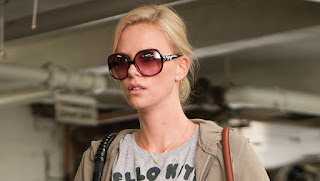Nina (Natalie Portman) lives and breathes ballet. She awakes to an anorexic's breakfast of an egg and half a grapefruit, and after a grueling day of practice, comes home to dance some more. Her feet are flayed and her state of mind wobbly next to the confident, determined Alpha dancers who surround her.
Her mother Erica (Barbara Hershey), a former ballerina, is both her supporter and her tormentor. Erica keeps her daughter housed in a pink bedroom that appears unchanged since Nina's childhood. Nina's life is an endless circuit from the Upper West Side apartment she shares with the overbearing, controlling Erica to the underground, bunker-like Lincoln Center rehearsal spaces where an equally ominous cast of characters lurk. It's all enough to make a girl go mad, and so it does in the exquisitely gothic vision of Darren Aronofsky's psychological thriller Black Swan.
With her enormous doe eyes, porcelain complexion, and tiny frame, Portman has always had a delicate, doll-like quality, which works magnificently in this film. Here she plays a woman in a state of arrested girlhood much like Sissy Spacek in Carrie or Catherine Deneuve in Repulsion, who has so channeled her femininity and ardor into ballet that her real sexuality appears to have atrophied. Nina is vulnerability incarnate, the projection of the wishes of her mother, her Svengali choreographer Thomas Leroy (a delightfully smarmy Vincent Cassel), and the expectant audience for whom she will perform.
Nina's fondest desire is the Swan Queen lead in Tchiakovsky's Swan Lake, a doppelganger role in which the ballerina is required to play both a pure, lovely White Swan and a dark, sexually enticing Black Swan. The role, and Aronofsky's film itself, reveals something of the absurd dualities of femininity: innocent or knowing, virginal or experienced, without any marriage of the two. In the process of securing the role, and reconciling her girlish virginity with an adult sexuality, Nina's psyche fractures. She becomes convinced that a seductive new dancer Lily (Mila Kunis) wants to steal the Swan Queen lead away from her. The film's plotline begins to echo the ballet itself, with the drama offstage as hysterical and highly-charged as anything onstage.
The Swan Queen role is the ultimate be-careful-what-you-wish-for devil's bargain, and it's given to Nina with definite strings attached. The ballet's impresario Leroy has just unloaded his drunken, vindictive prima ballerina Beth (Winona Ryder), who has grown too old for ballet, and has his sights set on Nina as her impressionable, malleable replacement. Black Swan shows the complicated head game acted out in creative realms where one person wields power and the other is the "muse." Thomas begins to manipulate Nina's fragile emotional state and play with her sexuality in the name of achieving a better performance. It's hard to imagine a better encapsulation of the curse of Aronofsky's own directorial profession, which so often pairs older, experienced men wielding enormous power with impressionable young actresses willing to do anything for a role.
Despite some of the film's campy trappings and dramatic excesses, Black Swan also has something of value to say about the rigor of the artist's life. Aronofsky takes pains to show the athleticism of ballet, an athleticism ironically acted out by frail-looking women who appear easily breakable but possess wills of steel. There is a fine line in Black Swan, between the self-punishment required of any great dancer and the masochism that often attends female perfectionism, evident in Nina's self-cutting and emotional insecurity. Black Swan makes one feel sweaty and trapped within Nina's consciousness. In the gloriously creepy opening scene, we watch from Nina's perspective as she dances onstage, assaulted more than aided by her male dancer. To be young, beautiful, and talented is as much a danger as an advantage.
Lensed by Matthew Libatique and supported by Aronofsky's murky, gothic treatment of repressed female sexuality, the film has shades of vintage Roman Polanski in its intertwined horror and sympathetic, penetrating study on its heroine's dilemma. Aronofsky's visually outrageous, spooky, fantastically hysterical expression of Nina's crack-up is a visual hall of mirrors to rival The Lady from Shanghai, a projection of the dancers' constant self-appraisal in mirrored ballet studios and Nina's fractured state of mind. Aronofsky plays with his audience's own perception of truth and fiction. Gloriously creative and utterly watchable, Black Swan pictures a hostile, perilous world for female artists in Aronofsky's splendid blend of excess and insight.




Comments